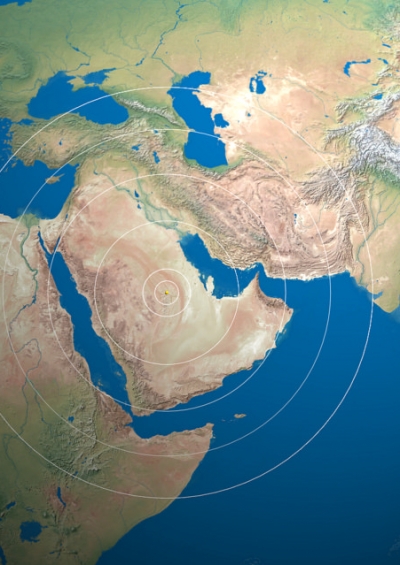The Saudi Paper Tiger
Far from dominant, Saudi Arabia’s future in the Middle East is that of a second fiddle state.
October 8, 2017

Contrary to its longstanding perception as a dominant force in the region, Saudi Arabia is fighting an uphill battle. Its future in the Middle East is that of a second fiddle state.
Weaker than Turkey, Iran and Egypt
There are three major powers in the Middle East, Turkey, Iran and Egypt (and also Israel, in certain regards).
Turkey, Iran and, Egypt have what Saudi Arabia does not: large populations, huge domestic markets, industrial bases, highly educated populations, and deep-seated identities grounded in histories of empire.
Other than Turkey and Egypt, Iran also has important natural resources. True, Saudi Arabia has oil and also Mecca, but that is not enough to compete.
Saudi Arabia is a regional power because of past containment policies towards Iran. Once Iran is unfettered, it will unlikely be able to compete for long.
Competing with Tehran
A major aspect of the Saudi-Iranian rivalry is the ideological and religious battle that Saudi Arabia has waged for the past four decades, the fallout of which is being felt across the globe.
Saudi Arabia has invested an estimated $100 billion to promote Sunni Muslim ultra-conservatism. To be clear, the bulk of that money did not go to militants. It went to religious, cultural and educational facilities that Saudi Arabia largely did not micro-manage or control.
There are only a handful of countries where the Saudis funded violence: Afghanistan, Pakistan, Bosnia, Iraq and Syria.
To be clear on this point as well: Ultra-conservatism does not by definition breed militancy, but it does create an enabling environment in conjunction with other factors. The key “inflammable” in that equation is a lack of social and economic opportunity.
The old oil order is getting unhinged
The blowback of ultra-conservatism is currently felt in the Saudi kingdom, as is evident in the economic and social transition which the Gulf states are embarking on.
To put the depth of the transition that lies ahead in proper perspective, keep in mind that every person born in the Gulf today is likely to witness the end of oil in his or her lifetime.
Economic streamlining and diversification was long overdue. It was made unavoidable by the drop in oil prices which, in a truly self-defeatist move, was sparked by a Saudi oil policy that focused on market share (remember shale oil?) rather than price.
The path which the Gulf countries have now embarked on is economic reform and limited social change, but no political liberalization. In practice, this amounts to the region’s ruling families unilaterally rewriting social contracts by rolling back the cradle-to-grave welfare state.
The youth factor
To be sure, the reforms, limited as they are, cater to the aspirations of significant segments of the youth who constitute the majority of the region’s citizenry. But they also go against the grain of vested interests and deep-seated ultra-conservatism.
With few exceptions, there is little indication that the reform process is being well-managed, certainly not in terms of the gap between expectations and delivery. In other words, the jury on the reform process is still out.
What makes things more ominous for Riyadh is that nowhere in the Gulf is the legacy of the 2011 Arab revolts potentially more potent than in Saudi Arabia.
This is a function of the country’s size and diverse range of people who have been repressed, regional economic weight and military might. Most of the Gulf may not adhere to Saudi Arabia’s Wahhabi interpretation of Islam, but is sensitive to political developments in the kingdom.
Conclusion
The bottom line of all of this is that Saudi Arabia’s current reform mix – the pursuit of short-term, opportunistic policies – will not provide any real solutions.
Without an honest tackling of fundamental problems, the already piled-up mountain of threats and problems is much more likely to expand further, rather than shrink.
Takeaways
Turkey, Iran and, Egypt have what Saudi Arabia does not: large populations, domestic markets and industrial bases.
Saudi Arabia is a regional power due to past containment policies towards Iran. Once Iran is unfettered it will not be able to compete.
Every person born in the Gulf today is likely to witness the end of oil in his or her lifetime.

